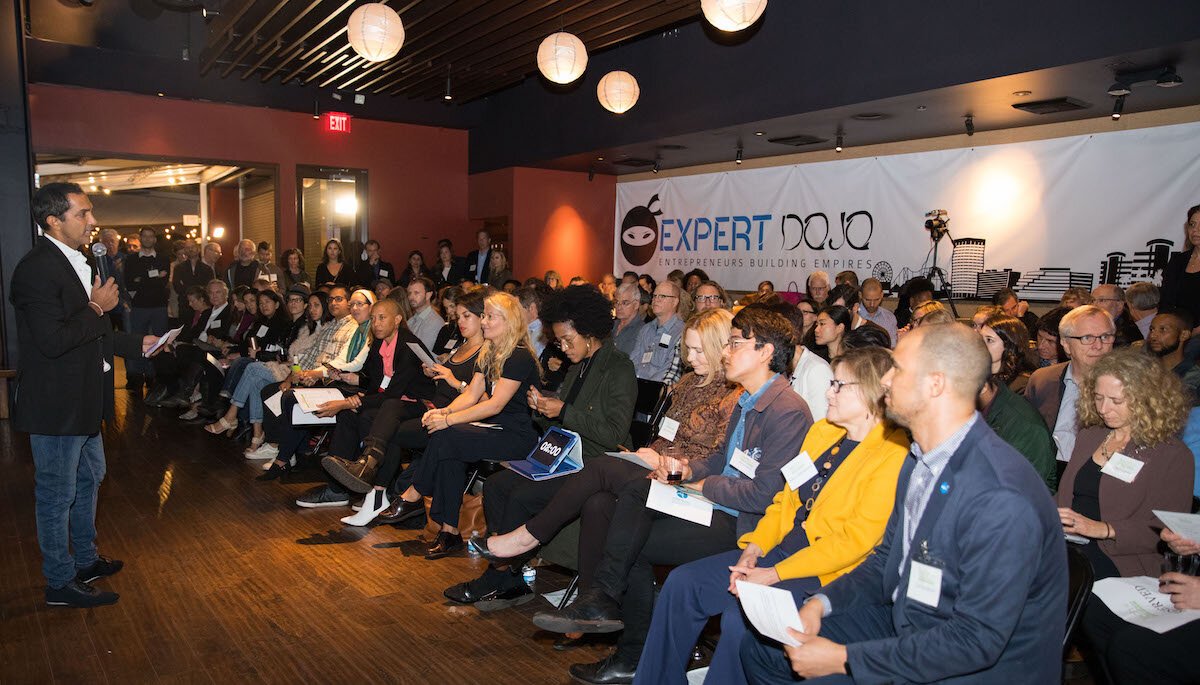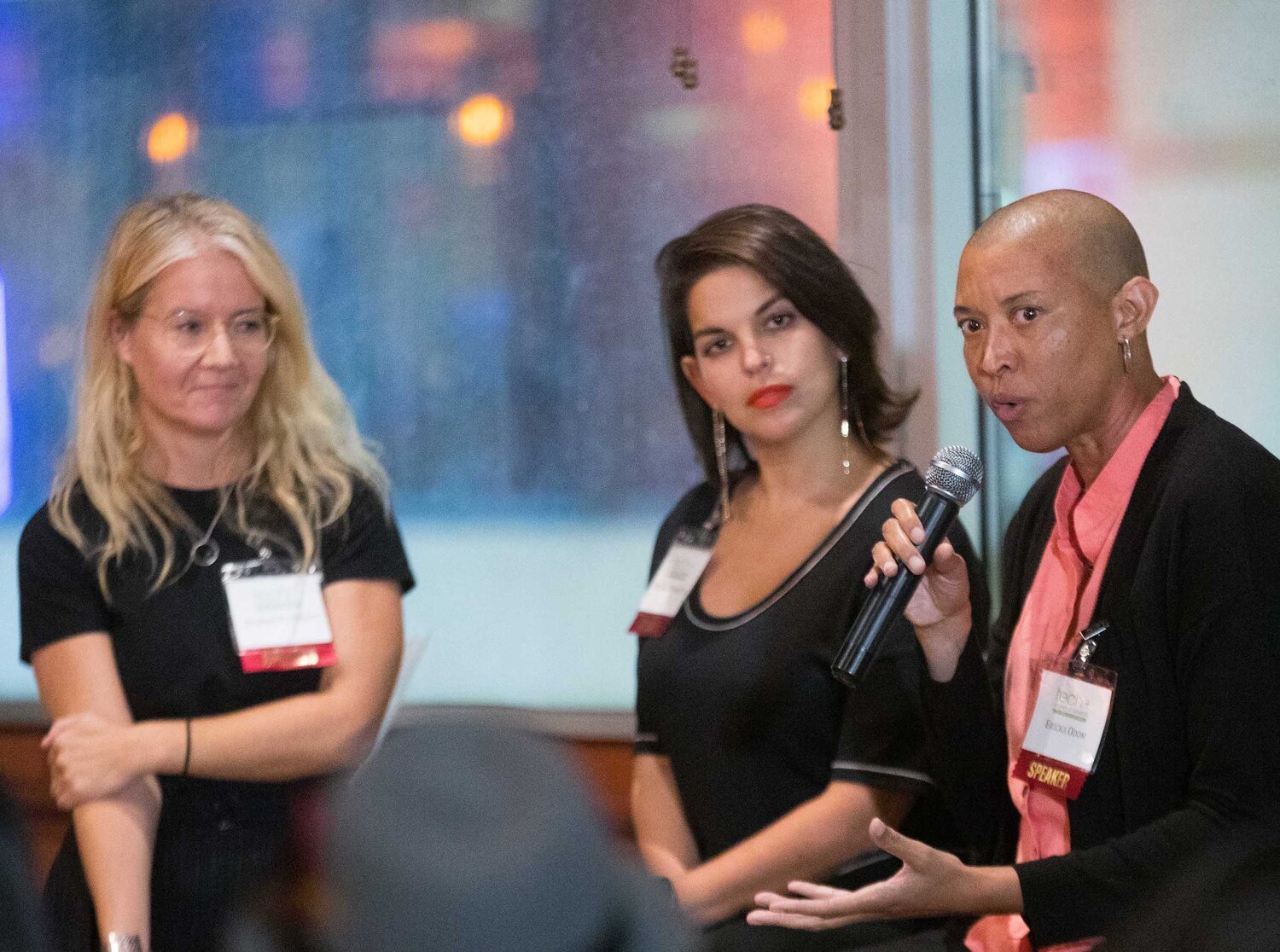Event Recap: Innovative Tech Solutions to Address Homelessness
Tech+Homelessness, November 13, 2019
A unique and important gathering in LA! Nancy Hammerman of Sutton Capital Partners brought together 200 technologists, investors, entrepreneurs, nonprofits, formerly homeless, and government for Tech + Homelessness at Expert Dojo in Santa Monica.
The focus of the night was to gather together, share ideas, become more visible in the community, make tech a more vocal part of grassroots problem solving, and inspire collective action on longer term solutions, with a theme of Commit. The night was successful in connecting organizations with tech expertise and raising funds and awareness for several growing organizations. The asks were clear and concise, and there were concrete actions every single person could take to help address homelessness. Hopefully the night’s impact will continue to expand over the next months and years.
Two years ago, Hammerman googled “homelessness and technology” and was shocked when nothing really came up. She knew that San Francisco had some initiatives, and she wondered why Los Angeles didn’t, despite having the country’s largest homeless population. This is when she first came up with the idea of gathering a cross functional group of people to discuss concrete actions and initiatives to combat homelessness.
A Sampling of Innovative Tech Solutions
Throughout the evening, we learned about several creative solutions that passionate technologists are working on. These initiatives show what’s happening now on the ground and illustrate great potential, indicating some directions for future work and impact.
• An AI Chatbot to Help People Navigate Homelessness
CG Chen, Founder and Executive Director at Ample Labs, is empowering the homeless in Toronto with Chalmers, an artificial intelligence-powered chatbot. Chalmers helps people navigate through homelessness and makes it easier to find social services like free meals, shelter, clothing banks, and more.
To date, Chalmers has helped over 8,000 people in Canada, and Chen has plans for Chalmers to speak and understand multiple languages beyond English. Chen is looking for additional funding to help expand Chalmers to other cities.
• An App to Learn People’s Stories and Help Cashlessly
Jonathan Kumar, CEO at Samaritan, is helping unsheltered people share their stories and connect with passersby who want to give directly towards their critical and unmet needs. Jonathan recounted how one day in Seattle he watched a homeless man trying to raise money for twenty minutes with no success. Jonathan went over and asked him what his challenges were in raising this money. The man explained that he had the wrong look, clothing, and skin color, and no one actually believed that he was homeless.
Samaritan produces smart wallets (digital tokens) specifically designed for people without a home, linking them to the financial capital and relational guidance needed to leave the street. The wallets are offered through care providers, equipping people experiencing homelessness to set their own housing and health goals, and then access the capital and community required to reach them. They completed a successful 500 person pilot in Seattle, and they’re now raising a round of funding and are looking for additional investors.
• A Shopping Cart Promoting Power, Connectivity, and Community
Skid Row Power, a collaborative between Pete White’s Los Angeles Community Action Network (LA CAN) and researchers from USC Annenberg, explores, designs, builds, and deploys creative solutions to empower Skid Row residents with online options. While 86% of Skid Row residents have cell phones, keeping these phones charged up represents a major obstacle. Interestingly, USC researchers thought the pressing need was for online access, but Skid Row residents overwhelmingly said that keeping their phones charged is crucial!
USC, LA CAN and 20 Skid Row residents co-designed a Charge ‘n Chill prototype that can charge 14 devices at a time, running on both battery and solar power with a sound system and a wireless Wi-Fi hotspot. It helps reduce Skid Row residents’ anxiety and stress of not having enough battery life to last throughout the day and risk losing communication with family and support services. It also supports community-building activities, brings people together, encourages people to think about new innovations to improve their community, and it helps stop businesses from discriminating against poor customers.
Skid Row Power is looking for additional funding, expertise, and equipment.
• A Digital Web Technology Job Training Program for Low Income and Underserved Women
Sharon Plunkett, Director of Innovation at St. Joseph Center, leads Codetalk, a rigorous 16 week program that provides skills, training, professional development, and support so that their graduates can pursue entry level positions in the technology sector. Tech is one of the few sectors that’s open to considering people from non-traditional backgrounds. The program finds completely overlooked talent, who have an incredible amount to offer. Codetalk students have overcome massive adversity, demonstrating grit, commitment, and motivation that companies value. Erika Odem, a project coordinator at the Honest Company and a graduate of the Codetalk program, recounted “I arrived desperate. It changed my life. Someone took a chance on me and showed me I mattered. You’re teaching people how to code while their lives are falling apart.”
Codetalk is free and all resources are provided, students just need to show up hungry to learn. Codetalk partners with tech companies who provide mentorship, curriculum consulting, and make sure that the work they’re doing is effective so students can get a job when they graduate. They’re currently looking for more mentors, tech partners, and additional paid internships.
• A Pro Bono Tech Community
Kat Karimi, Co-Founder and Executive Director at Civic Innovation Lab, is building a community of pro bono digital professionals who want to give their time and expertise back to the community. She connects local tech professionals with nonprofits to develop solutions that improve our communities.
Their Pro Bono Tech program has 6-week structured cohorts to address local organizations’ operational or digital challenges. They conduct a needs assessment with nonprofits and then scope out the project and determine the digital expertise needs. They just finished their first cohort in LA, and they have a demo day Thursday (11/21/19) in downtown LA. They’re launching another cohort next spring, and welcome all digital professionals to apply to be part of the cohort.
And Other Organizations Doing Great Things
In addition to these innovative technological solutions, we heard from several other organizations that are doing great work and hoping to partner with tech experts to increase their impact. These organizations include: Safe Parking LA + Vitu, Venice Family Clinic, The Caring Connection and Shower of Hope.
Conclusion
The evening was truly inspiring. Bringing people together across technology, investing, entrepreneurship, non-profits, and government was a great opportunity to break down barriers and build relationships across industries. This event brought together a very wide range of professionals. Hammerman did an amazing job of getting everyone in one room and inviting organizations to clearly articulate their missions, visions, and needs. After discussing what they’re working on, organizations presented concrete asks to the room and enabled people to really commit and see how they can get directly involved and make an impact. The ways to action were diverse and it truly felt like there was something every single person could do in both the short and long term to advance the fight against homelessness.
– This article was written by Meghan Wenzel and Karen Borchgrevink on behalf of LA Tech4Good




